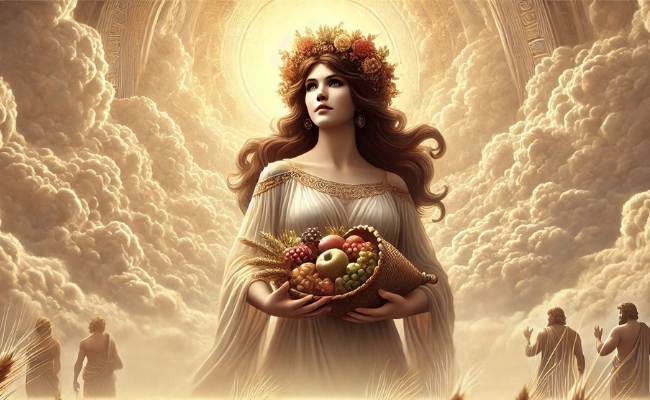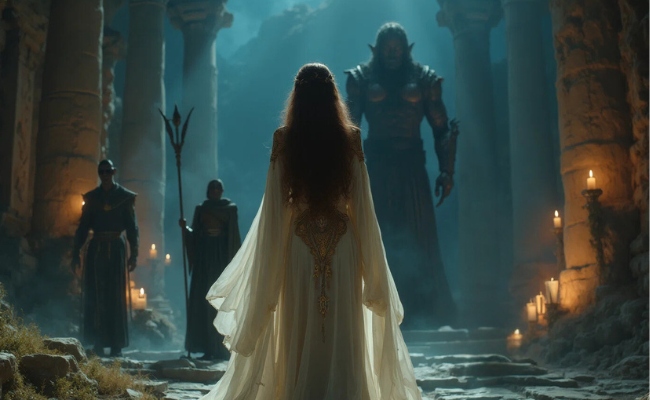Home » Demeter’s Friends, Enemies and Rivals: All Her Key Relations
Demeter’s Friends, Enemies and Rivals: All Her Key Relations
Her story is filled with relationships that shaped her life. Demeter’s friends played a crucial role in helping her through the loss of her daughter.
The bonds she made played a big role in the myths we know today.
But Demeter’s enemies often sought to undermine her control over agriculture and the harvest. These conflicts not only tested her resilience but also shaped her identity as a powerful goddess.
Through both friendship and rivalry, her relationships influenced the balance of nature and the lives of mortals.
In this post, we’ll explore these relationships and why they matter. Learn all you need to know about Demeter’s friends as well as her arch enemies.
Was Demeter Friends with Other Gods?

Here’s who Goddess Demeter’s friends in Greek mythology were:
Persephone
Naturally, her daughter Persephone was an ally.
The bond between the two is one of the most enduring and emotional relationships in Greek mythology.
As mother and daughter, their connection goes beyond the ordinary, symbolizing both love and the cycle of life.
When Persephone is taken by Hades to the underworld, Demeter’s grief is so profound that she causes the earth to wither and die, leading to the first winter.
This myth explains the seasons, as Persephone spends part of the year with Hades and part with her mother, bringing life and growth back to the world.
Their bond reflects themes of maternal devotion, loss, and reunion.
Her determination to be reunited with Persephone also represents the power of love and the natural cycles of life, death, and rebirth.
This is one of Demeter’s friends that gave her the most purpose.
Hecate
Hecate was one of her most loyal friends. She played an important role in the search for Persephone. When Persephone went missing, Hecate offered her help without hesitation.
This act of kindness showed the strength of their friendship.
Demeter’s friends were vital during this difficult time, and Goddess Hecate stood out as a trusted ally.
She guided the goddess of harvest with her wisdom and light, helping her find the path to the underworld.
Hecate’s loyalty never wavered, making her one of the most dependable companions.
Their closeness highlighted the importance of trust and support.
Her journey would have been much harder without Hecate’s assistance.
This bond between them is a great example of how friends can help each other in dark times.
Triptolemus
Triptolemus, a mortal, is also considered a friend of Goddess Demeter.
She teaches him the secrets of agriculture, making him a key figure in spreading knowledge of farming to humanity.
Their relationship represents the nurturing side of the goddess and her role in the growth of crops. Through Triptolemus, her gift of agriculture spreads far and wide, symbolizing her desire to provide for humanity.
This bond underscores her role as a protector of the earth and the source of life’s sustenance, fostering a deep connection between gods and mortals.
Hermes
Additionally, Hermes, the messenger god, assists her by negotiating Persephone’s return from the underworld, allowing mother and daughter to reunite for part of the year.
So he is considered one of Demeter’s friends and allies.
These figures symbolize support and loyalty to the goddess in her time of need.
Hermes’ swift intervention not only aids in restoring balance to the world but also highlights the strong bonds between gods who work together to protect the natural order.
His actions reflect the interconnectedness of the divine realm, where cooperation and loyalty play a vital role in resolving conflicts and ensuring harmony.
Who were Demeter’s Enemies?

Demeter’s enemies also played an important role in her story. They caused pain and tested her strength.
These challenges shaped who she became.
In Greek mythology, one of her primary enemies is Hades, the god of the underworld.
He abducts her daughter, Persephone, and takes her to the underworld to be his queen, which triggers her profound grief and leads to the earth’s barrenness.
Although Hades later agrees to let Persephone spend part of the year with her mother, his actions create ongoing tension between him and her mother.
Poseidon can also be considered one of Demeter’s enemies. In some myths, he pursued her with unwanted advances, causing her distress.
To avoid him, she transformed into a mare, but Poseidon transformed into a stallion and still caught her, resulting in a strained relationship.
Lastly, Erysichthon, a mortal king, offends the goddess by cutting down her sacred grove.
In response, she curses him with insatiable hunger, marking him as another significant adversary in her mythological stories.
This also shows her diverse personality within ancient Greek mythology.
Her enemies sometimes acted out of jealousy or greed.
Why Demeter’s Friendships Matter
Her relationships play a crucial role in Greek mythology because they reflect the balance between nurturing and conflict, both key themes in the mythological world.
As the goddess of agriculture and the harvest, Demeter’s friends like Hecate symbolize the wisdom and guidance needed to overcome challenges and protect the earth’s fertility.
And her bond with Persephone highlights the importance of family, love, and the cycle of life and death, as their reunion each year brings about the changing seasons.
This connection shapes the world’s agricultural rhythm, making this goddess a vital force in the lives of both gods and mortals. It’s one of the many reasons people worship this goddess.
On the other hand, Demeter’s enemies such as Hades and Poseidon, introduce conflict that challenges her power and resolve.
These struggles demonstrate her strength and the importance of perseverance in overcoming hardship. Her relationships with both friends and enemies show that even the gods must navigate complex dynamics.
Through these connections, her stories convey deeper lessons about love, loss, loyalty, and resilience, making her an enduring figure in Greek mythology.
Conclusion to Demeter’s Friends and Enemies
In ancient mythology, loyalty and support from Demeter’s friends were essential in maintaining the balance of nature.
Her relationships left a lasting mark on mythology.
Her friends provided support during her hardest moments, especially when she searched for her daughter.
Without them, the myths surrounding her would be incomplete. These connections influenced not just her life, but also the natural world.
Demeter’s enemies like Hades and Poseidon emphasize her strength and resolve when facing adversity.
Whether fighting for the return of her daughter or dealing with unwanted advances, she remains a powerful figure of perseverance.
The balance between these relationships made her journey even more powerful.
She became a symbol of both resilience and love.
Demeter’s friends and enemies played a significant part in her legacy, showing how relationships can shape the world around us.
Table of Contents
2024 All rights reserved.
